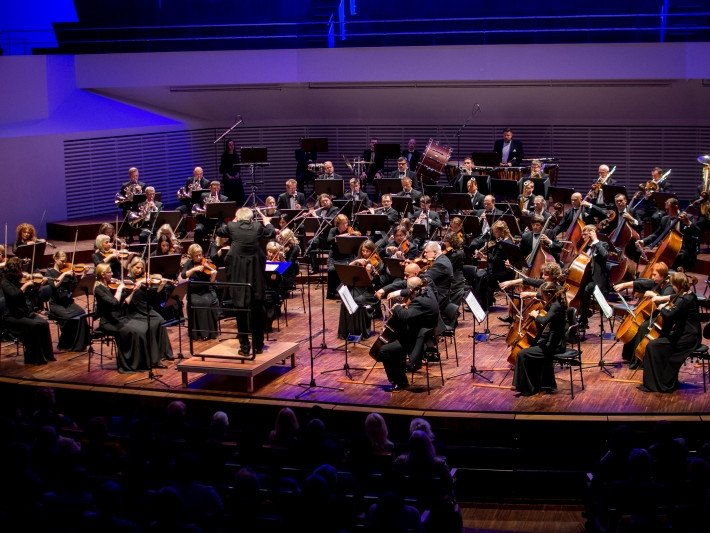
Liepāja Symphony Orchestra
The origins of the Liepāja Symphony Orchestra date back to 1881, when the first philharmonic in the Baltics was established in Liepāja, and along with it an orchestra. Following the Second World War, the orchestra resumed playing under the auspices of the Liepāja Music High School and for many years was led by conductor Valdis Vikmanis, who also directed the school. In late 1986, the orchestra was granted the status of a professional symphony orchestra, and in 2010 it was designated a national orchestra.
Mikhail Orekhov served as the first artistic director and principal conductor of the Liepāja Symphony Orchestra, from 1988 until 1991. The period from 1992 to 2009 with artistic director and chief conductor Imants Resnis was an important time for the orchestra. Resnis significantly expanded the range of the orchestra’s performance; in addition to concerts in Riga, Liepāja and other cities in Latvia, the orchestra also regularly toured abroad. In fact, Resnis inspired the city of Liepāja to begin planning the design and construction of the Great Amber Concert Hall, which finally opened in November 2015 with a celebratory concert by the Liepāja Symphony Orchestra.
Resnis also founded the International Piano Stars Festival, which since 1993 has grown to become one of Latvia’s most important and sustainable festivals. Approximately 170 pianists from more than 30 countries have performed at the festival. Renamed the Liepāja International Stars Festival in 2016, it now also features virtuosi on many other instruments as well as renowned singers.
The “Liepāja Summer” concert series established in the 1960s became a full-fledged festival in 2010, with the orchestra musicians now presenting works of symphonic and chamber music to festival audiences.
Atvars Lakstīgala served as the Liepāja Symphony Orchestra’s artistic director and principal conductor from 2010 to 2017. During this time, the orchestra continued working with leading Latvian soloists as well as performing throughout Latvia and the Baltics; it also toured China, Japan, India, Greece and Azerbaijan. Likewise, the orchestra developed a close collaboration with the Toccata Classics, Wergo and Odradek recording labels. Kurland Sounds, an album released by Odradek, received the following praise from BBC Music Magazine: “A bracing selection of contemporary Latvian music combining Eastern colour and Western sonorities in dazzling combinations with an operatic intensity that will leave you breathless.”
Latvian music has always made up a large part of the Liepāja Symphony Orchestra’s repertoire, and the orchestra has supported and promoted the work of its country’s composers with an inexhaustible sense of mission during the tenures of both Resnis and Lakstīgala. It has commissioned, premiered and recorded countless new symphonic compositions. And it does so on a grand scale, an example being the monumental “Liepāja Concerti” cycle that over the course of seven years (2011–2017) commissioned and premiered twelve new works by Latvian composers Platons Buravickis, Rihards Dubra, Andris Dzenītis, Ēriks Ešenvalds, Juris Karlsons, Kārlis Lācis, Arturs Maskats, Kristaps Pētersons, Santa Ratniece, Vilnis Šmīdbergs, Andris Vecumnieks and Rihards Zaļupe. Among the orchestra’s newest projects is its cycle of Centenary Symphonies.
The Liepāja Symphony Orchestra has twice won the Latvian Grand Music Award and is a six-time winner of the Annual Latvian Music Recording Industry Award. Its artistic director and principal conductor since 2017 is Gintaras Rinkevičius.
LMIC 2020
